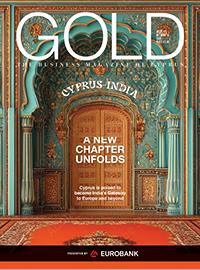Sanjay Tugnait, President & CEO of Fairfax Digital Services, which provides digital transformation services to the Fairfax Group globally, discusses Cyprus’ growing appeal for Indian companies and outlines a focused five-year, five-sector plan to deepen opportunities between India and Cyprus
What were the main drivers for choosing Cyprus as a destination? Was there a calculation that Cyprus offered something different from other jurisdictions?
There are three forces shaping the global economy right now: deglobalisation, decarbonisation and digitisation. On deglobalisation, the focus is on producing locally. Post-COVID supply chain shocks, coupled with data protection concerns, have reinforced the trend towards localisation. Decarbonisation is equally pressing. Data centres, AI hubs and electricity demand are consuming vast amounts of energy.
Locating closer to end users allows more efficient energy management and emissions reduction. The EU has been strong on this and, as Cyprus prepares to hold the EU presidency, its role will strengthen. Digitisation, though, is where growth is accelerating. Customers now demand speed and safety, which can only be delivered effectively within national or regional borders. We also may be the last generation of managers leading only humans. The next will lead humans and digital workers. Cyprus sits at the intersection of these forces, especially through the India-Middle East-Europe Corridor (IMEC). Fairfax is heavily invested in both India and Cyprus, where we are the largest shareholder in Eurobank and, through our $1.3 billion acquisition of Hellenic Bank, now represent 5-6% of GDP. That underscores our long-term commitment.
Through Fairfax Digital Services, we set up a hub for Agentic AI in Cyprus, working with partners such as LTIMindtree, Voicing AI and Eurobank. The initiative had full backing from the Government. Beyond that, we’ve encouraged Fairfax portfolio companies to expand here. Thomas Cook India chose Cyprus after evaluating other EU jurisdictions, supported by Eurobank and PwC Cyprus. In many ways, Cyprus has become a corridor for Indian companies into the EU – built on speed, security and safety and underpinned by a deeper connection: Greece and Cyprus gave the world democracy and now we like to say that India is giving the world digital democracy. So this collaboration between India and Cyprus is, in a sense, digital democracy in action. The visit of Prime Minister Modi to Cyprus – the first of its kind in almost 25 years – has also been key in strengthening these ties.
How does the reality of doing business in Cyprus compare with your experience in India? Have you encountered practices or attitudes that struck you as markedly different?
I think that, more than the differences, what stands out is the common heritage. We’re both ancient civilisations, reflected in family values, culture and people – I feel a strong connection with Cyprus. Beyond that, there are practical advantages: English common law, Commonwealth membership, a strong judiciary, EU access and strategic placement in the IMEC corridor. Cyprus also offers attractive tax structures for Indian companies. Its small size allows it to move quickly and efficiently like a speedboat, compared with India’s scale, which makes it more like a cruise ship.
From your perspective, where does Cyprus need to improve if it is to become more competitive in attracting Indian companies?
High-level meetings between President Christodoulides and Prime Minister Modi, as well as with private stakeholders like Prem Watsa, Chairman and CEO of Fairfax Financial Holdings – known as the Warren Buffet of Canada – should continue. Connectivity is also essential. Equally important is creating “poster children” for success: Fairfax Digital Services’ Agentic AI platform in Cyprus, Eurobank opening a Mumbai office and Thomas Cook India setting up its EU base in Cyprus. Each demonstrates what’s possible and collectively tells a compelling story of Cyprus as a hub for innovation, technology and business.
Finally, looking five to ten years ahead, what opportunities and risks do you think will define the India-Cyprus business relationship?
Things are on the right track as there is political will across the board; it is too early to discuss risks. Nonetheless, we should maintain speed of execution. The key is a sectoral approach: focus on areas where India’s strengths align with Cyprus’ access to the EU, safety, security and speed. Airports and ports, pharma, tourism, AI, digital payments – like Fairfax Digital Services and Eurobank partnering with NPCI to use India’s Unified Payments Interface (UPI) – aviation, film, defence and infrastructure all offer opportunities. That’s why I advocate a simple five-year, five-sector plan – a “5x5 plan”. Vision is useful only if paired with execution and measurable progress: how many unicorns have been attracted, how many infrastructure projects delivered? Without those measurements, any plan is just words.
- This article was first published in the October issue of GOLD magazine. Click here to view it









